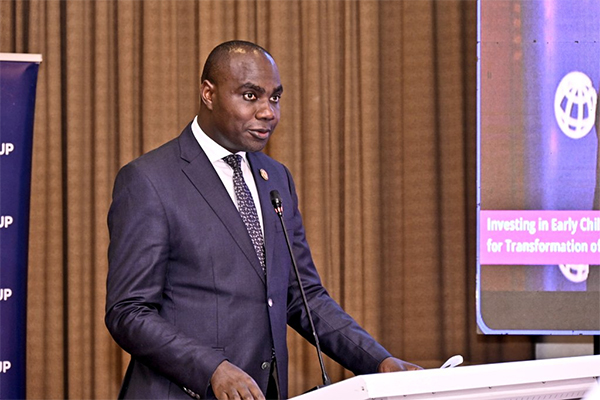
Kampala, Uganda | THE INDEPENDENT | Henry Musasizi, the State Minister for Finance, Planning and Economic Development says the country has now fully overcome the effects of the global and local shocks to the economy that happened over the last three to four years and is now on its desired growth trajectory.
He adds that the World Bank’s suspension of new funding to Uganda in 2023, as well as other factors, have made Uganda more resilient and enabled it to manage borrowing better as well as get more export markets. He was speaking at the launch of the 24th Edition of the World Bank’s Uganda Economic Update on “Investing in Early Childhood Development for Transformation of Human Capital in Uganda”.
The World Bank hailed Uganda’s current growth rates of above 6 percent but warned that there are downside risks that could slow down or reverse the trend. The latest report on the Ugandan economy shows that despite ongoing global challenges and geopolitical tensions especially in the Middle East, economic activity in Uganda has remained robust, with real gross domestic product (GDP) growing by 6.1 percent in 2023/2024 on top of 5.3 percent growth registered a year before.
The Bank’s Country Director for Uganda, Kenya, Somalia, and Rwanda, Qimiao Fan, said the growth is mainly coming from exports but also investments in the oil and gas sector, with production expected to commence in 2027. Qimiao warned that while the high growth is expected to be sustained, any delays in the production date will most likely affect the growth figures.
This growth has been broad-based with significant contributions from the service sector, particularly tourism, as well as the industrial sector including manufacturing and construction. The edition also shows good macroeconomic indicators for the country including contained inflation below the central bank targets, and a stable foreign exchange rate.
The Country Director urges sustained reform implementation to ensure more resources are mobilised for the country, especially as more money will be needed as the country goes into general elections next financial year. He says the rationalization of public expenditure was a good move and could help the country if handled well, to avoid wasteful expenditure.
The report says that the country has done well in increasing exports but that the high import bill mainly because of the imports for the oil and gas industry are making expanding the current account deficit. If oil production begins on schedule and reaches peak production of 230,000 barrels per day, it will significantly boost growth in the medium term, and help manage the national debt better.
Besides, the report says, public debt is projected to increase slightly to 52 percent of GDP due to election-related spending as the country heads to the polls early in 2026.
In the meantime, Qimiao calls for diversification of exports and increase productivity especially in areas that create more jobs.
On his part, the World Bank Country Manager, Mukami Kariuki pledged that the World Bank will continue supporting the country’s progress and growth agenda. She says, however, that the growth rates are not a given, adding that Uganda must continue policies like fiscal consolidation, to overcome the downside risks to the economy.
The government has since last financial year been talking about repurposing resources which, it says, is aimed at focusing the limited resources on more vital areas. These also include human capital, agroindustry, tourism, mineral and mining, as well as Information and Communication Technology (ICT).
Moses Bekabye, the Technical Advisor for Economic Affairs in the Ministry of Finance, Planning and Economic Development, says they are focusing on the domestic revenue mobilization and improving revenue expenditure, as well as investing in the high impact areas. With fruits from these interventions, he says, the country will in the end even be able to manage its debt.
*****
URN
 The Independent Uganda: You get the Truth we Pay the Price
The Independent Uganda: You get the Truth we Pay the Price





